Collaborating with Foreign Partners to Meet Global Challenges
 U.S.-Iran Discussion on Environmental Trends: Proceedings of a Workshop - in Brief (2018)
U.S.-Iran Discussion on Environmental Trends: Proceedings of a Workshop - in Brief (2018)
 Read online free
Read online free  Download the Free PDF
Download the Free PDF
On December 4-6, 2017, the U.S. National Academies of Sciences, Engineering, and Medicine, with the support of The World Academy of Sciences, convened a workshop in Trieste, Italy, where American and Iranian researchers discussed global environmental trends. This publication summarizes the presentations and discussions from the workshop. (Development, Security, and Cooperation (DSC))
 U.S.-Iran Engagement in Science, Engineering, and Health (2010-2016): A Resilient Program but an Uncertain Future (2017)
U.S.-Iran Engagement in Science, Engineering, and Health (2010-2016): A Resilient Program but an Uncertain Future (2017)
 Read online free
Read online free  Download the Free PDF
Download the Free PDF
More than 700 Americans and Iranian scientists, engineers, and health professionals from 60 U.S. and Iranian universities, research centers, and other organizations in the United States and Iran participated in the bilateral exchange program sponsored by the National Academies and their partners from 2010-2016. This report documents many of the scientific rewards that have surmounted the political, technical, and administrative challenges in developing and implementing exchanges, and describes the challenges that lie ahead. (Development, Security, and Cooperation (DSC))
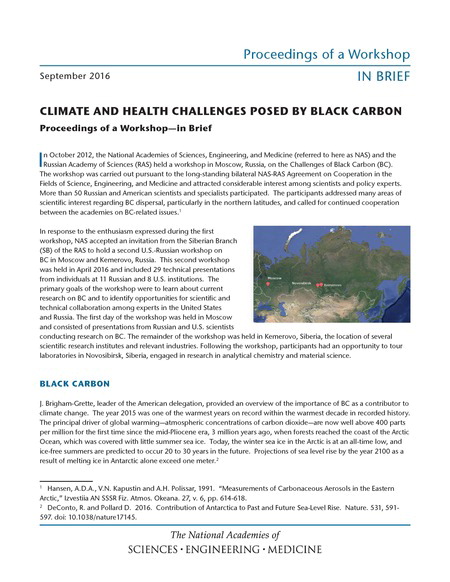 Climate and Health Challenges Posed by Black Carbon: Proceedings of a Workshop–in Brief (2016)
Climate and Health Challenges Posed by Black Carbon: Proceedings of a Workshop–in Brief (2016)
 Read online free
Read online free  Download the Free PDF
Download the Free PDF
In October 2012, the National Academies of Sciences, Engineering, and Medicine and the Russian Academy of Sciences held a workshop in Moscow, Russia, on the Challenges of Black Carbon (BC). The workshop was carried out pursuant to the long-standing bilateral NAS-RAS Agreement on Cooperation in the Fields of Science, Engineering, and Medicine and attracted considerable interest among scientists and policy experts. More than 50 Russian and American scientists and specialists participated. The participants addressed many areas of scientific interest regarding BC dispersal, particularly in the northern latitudes, and called for continued cooperation between the academies on BC-related issues. A second workshop was held in April 2016 and included 29 technical presentations from individuals at 11 Russian and 8 U.S. institutions. The primary goals of the workshop were to learn about current research on BC and to identify opportunities for scientific and technical collaboration among experts in the United States and Russia. (Development, Security, and Cooperation (DSC))
 Belarusian-American Workshop on Scientific and Technical Cooperation: Proceedings of a Workshop in Brief
Belarusian-American Workshop on Scientific and Technical Cooperation: Proceedings of a Workshop in Brief
(2016)
 Read online free
Read online free  Download the Free PDF
Download the Free PDF
The U.S. National Academies of Sciences, Engineering, and Medicine, in cooperation with the National Academy of Sciences of Belarus (NASB), convened an inter-academy workshop on December 15-16, 2015, in Minsk, Belarus. Six American specialists in outreach activities of universities and more than 20 Belarusian scientists, educators, and government officials participated in the workshop. The goals of the workshop were to identify activities of mutual interest to the Academies and to identify technical areas for cooperation. (Development, Security and Cooperation (DSC))
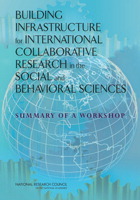 Building Infrastructure for International Collaborative Research in the Social and Behavioral Sciences: Summary of a Workshop (February 2015)
Building Infrastructure for International Collaborative Research in the Social and Behavioral Sciences: Summary of a Workshop (February 2015)
 Read online free
Read online free  Buy the book or Download the Free PDF
Buy the book or Download the Free PDF  View report highlights (PDF)
View report highlights (PDF)
Building Infrastructure for International Collaborative Research in the Social and Behavioral Sciences is the summary of a workshop convened by the National Research Council's Committee on International Collaborations in Social and Behavioral Sciences in September 2013 to identify ways to reduce impediments and to increase access to cross-national research collaborations among a broad range of American scholars in the behavioral and social sciences (and education), especially early career scholars. Over the course of two and a half days, individuals from universities and federal agencies, professional organizations, and other parties with interests in international collaboration in the behavior and social sciences and education made presentations and participated in discussions. They came from diverse fields including cognitive psychology, developmental psychology, comparative education, educational anthropology, sociology, organizational psychology, the health sciences, international development studies, higher education administration, and international exchange. (Board on International Scientific Organizations (BISO))
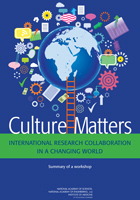 Culture Matters: International Research Collaboration in a Changing World--Summary of a Workshop (September 2014)
Culture Matters: International Research Collaboration in a Changing World--Summary of a Workshop (September 2014)
 Read online free
Read online free  Buy the book or Download the Free PDF
Buy the book or Download the Free PDF
Culture Matters is the summary of a workshop convened by the Government-University-Industry Research Roundtable (GUIRR) in July 2013 to address how culture and cultural perception influence and impact the process by which research agreements are made and negotiated across international boundaries. In this workshop, "Culture Matters: An Approach to International Research Agreements", representatives from around the world and from GUIRR's three constituent sectors - government, university, and industry - gathered to provide input into four specific meeting tracks or domains. The tracks focused on research and agreements affecting or involving people/human subjects; environmental and natural resources; science, engineering, and manufacturing; and agriculture and animal issues. This report examines each of these domains and the role that culture and cultural expectations may have in the forging and implementation of international research agreements. (Government University Industry Research Round Table (GUIRR))
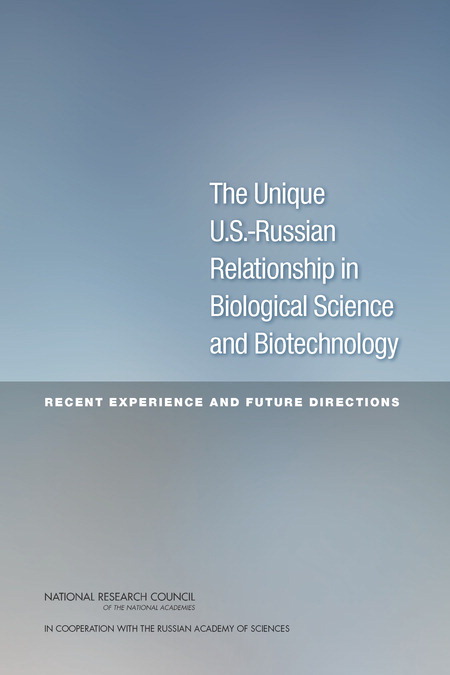 The Unique U.S.-Russian Relationship in Biological Science and Biotechnology: Recent Experience and Future Directions (2013)
The Unique U.S.-Russian Relationship in Biological Science and Biotechnology: Recent Experience and Future Directions (2013)
 Read online free
Read online free  Buy the book or Download the Free PDF
Buy the book or Download the Free PDF  View report highlights (PDF)
View report highlights (PDF)  View media coverage
View media coverage
In the fall of 2010, the U.S. National Academies (consisting of the National Academy of Sciences, the National Academy of Engineering, and the Institute of Medicine) and the Russian Academy of Sciences (in cooperation with the Russian Academy of Medical Sciences and the Russian Academy of Agricultural Sciences) initiated a joint study of U.S.-Russian bilateral engagement in the biological sciences and biotechnology (hereinafter collectively referred to as bioengagement). The U.S. Department of State and the Russian Academy of Sciences provided support for the study. The academies established a joint committee of 12 leading scientists from the two countries to assess bioengagement activities since 1996 and to provide recommendations as to collaborative efforts in the near future. The Unique U.S.-Russian Relationship in Biological Science and Biotechnology: Recent Experience and Future Directions summarizes the principal conclusions and recommendations of the study. (Development, Security, Cooperation (DSC))
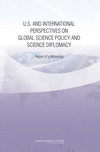 U.S. and International Perspectives on Global Science Policy and Science Diplomacy (Dec 2011)
U.S. and International Perspectives on Global Science Policy and Science Diplomacy (Dec 2011)
 Read online free
Read online free  Buy the book or Download the Free PDF
Buy the book or Download the Free PDF
The United States and other countries around the world face problems of an increasingly global nature that often require major contributions from science and engineering that one nation alone cannot provide. The advance of science and engineering is an increasingly global enterprise, and in many areas there is a natural commonality of interest among practitioners from diverse cultures. In response to challenges, the National Academies held a workshop in Washington, DC, in February 2011, to assess effective ways to meet international challenges through sound science policy and science diplomacy.
U.S. and International Perspectives on Global Science Policy and Science Diplomacy summarizes issues addressed during this workshop. Participants discussed many of the characteristics of science, such as its common language and methods; the open, self-correcting nature of research; the universality of the most important questions; and its respect for evidence. These common aspects not only make science inherently international but also give science special capacities in advancing communication and cooperation. Many workshop participants pointed out that, while advancing global science and science diplomacy are distinct, they are complementary, and making them each more effective often involves similar measures. Some participants suggested it may sometimes be more accurate to use the term global science cooperation rather than science diplomacy. Other participants indicated that science diplomacy is, in many situations, a clear and useful concept, recounting remarkable historical cases of the effective use of international scientific cooperation in building positive governmental relationships and dealing with sensitive and urgent problems.
To gain U.S. and international perspectives on these issues, representatives from Brazil, Bangladesh, Egypt, Germany, Jamaica, Kazakhstan, Malaysia, Morocco, Rwanda, South Africa, and Syria attended the workshop, as well as two of the most recently named U.S. science envoys, Rita Colwell and Gebisa Ejeta. (Development, Security, Cooperation (DSC))
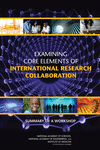 Examining Core Elements of International Research Collaboration: Summary of a Workshop (September 2011)
Examining Core Elements of International Research Collaboration: Summary of a Workshop (September 2011)
 Read online free
Read online free  Buy the book or Download the Free PDF
Buy the book or Download the Free PDF
The globalization of science, engineering, and medical research is proceeding rapidly. The globalization of research has important implications for the U.S. research enterprise, for the U.S. government agencies, academic institutions, and companies that support and perform research, and for the world at large. As science and technology capabilities grow around the world, U.S.-based organizations are finding that international collaborations and partnerships provide unique opportunities to enhance research and training. At the same time, significant obstacles exist to smooth collaboration across national borders. Enhancing international collaboration requires recognition of differences in culture, legitimate national security needs, and critical needs in education and training. (Government University Industry Research Round Table (GUIRR))
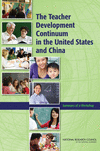 The Teacher Development Continuum in the United States and China: Summary of a Workshop (November 2010)
The Teacher Development Continuum in the United States and China: Summary of a Workshop (November 2010)
 Read online free
Read online free  Download the report brief (PDF)
Download the report brief (PDF)  Buy the book or Download the Free PDF
Buy the book or Download the Free PDF  View video
View video
In 1999, Liping Ma published her book Knowing and Teaching Elementary Mathematics: Teachers' Understanding of Fundamental Mathematics in the United States and China, which probed the kinds of knowledge that elementary school teachers need to convey mathematical concepts and procedures effectively to their students. Later that year, Roger Howe, a member of the U.S. National Commission on Mathematics Instruction (USNC/MI), reviewed the book for the Notices of the American Mathematical Society, concluding that it 'has lessons for all educational policymakers.'
Intrigued by the idea of superrank teachers, the USNC/MI sponsored a workshop entitled 'The Teacher Development Continuum in the United States and China'. The purpose of the workshop was to examine the structure of the mathematics teaching profession in the United States and China. The main presentations and discussion from the workshop are summarized in this volume. (Board on International Scientific Organizations (BISO))
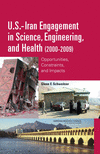 U.S.-Iran Engagement in Science, Engineering, and Health (2000-2009): Opportunities, Constraints, and Impacts (November 2010)
U.S.-Iran Engagement in Science, Engineering, and Health (2000-2009): Opportunities, Constraints, and Impacts (November 2010)
 Read online free
Read online free  Buy the book or Download the Free PDF
Buy the book or Download the Free PDF  View media coverage
View media coverage
During the first decade of the 21st century, the National Academies, working with a number of partner organizations in Iran, carried out a program of U.S.-Iran engagement in science, engineering, and health (herein referred to as science engagement). This book reviews important aspects of the science engagement program, including: (a) objectives of the program, (b) opportunities and constraints in developing the program, and (c) scientific and political impacts of the activities. Suggestions for future activities that draw on the conclusions and recommendations that have emerged from workshops and other types of interactions are set forth. Of course, the political turmoil within Iran and uncertainties as to the direction of U.S.-Iran government-to-government relations will undoubtedly complicate initiation and implementation of new science engagement activities in the near term. At the same time, many American and Iranian participants and important government officials in the United States and Iran have believed that science engagement can contribute to the evolution of an improved political environment for development of less adversarial relations between the two governments. (Development, Security, and Cooperation)
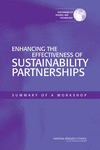 Enhancing the Effectiveness of Sustainability Partnerships: Summary of a Workshop (December 2009)
Enhancing the Effectiveness of Sustainability Partnerships: Summary of a Workshop (December 2009)
 Read online free
Read online free  Buy the book or Download the Free PDF
Buy the book or Download the Free PDF
Sustainable development--meeting human needs while nurturing and restoring the planet's life support systems--requires a continuous process of scientific innovation, new knowledge and learning, and collaborative approaches to implementing technologies and policies. To address these challenges, different stakeholder groups are increasingly seeking to ally themselves through partnership, in order to implement projects, deliver services, establish secure funding mechanisms, and achieve on the ground results. Advocates of this collaborative approach point to the failure of governmental regulations, international commitments, or business as usual. However, skeptics often question the effectiveness of partnerships at achieving sustainable development goals and, in the absence of demonstrated results, wonder where partnerships are adding value. A symposium held in June 2008 and summarized in this volume, attempted to advance the dialogue on partnerships for sustainability in order to catalyze existing knowledge and inform future efforts. Ideas that came out of discussions at the symposium will help leaders in government, the private sector, foundations and NGOs, and universities, both in the United States and internationally, as they develop and participate in new partnerships for sustainability. (Policy and Global Affairs (PGA))
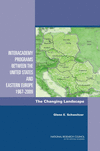 Interacademy Programs Between the United States and Eastern Europe 1967-2009: The Changing Landscape
Interacademy Programs Between the United States and Eastern Europe 1967-2009: The Changing Landscape
(November 2009)
 Read online free
Read online free  Buy the book or Download the Free PDF
Buy the book or Download the Free PDF
This report documents how interacademy programs have played a significant role in establishing and maintaining American scientific contacts with colleagues in Eastern Europe prior to and following the lifting of the Iron Curtain. The book also discusses the changing roles of the academies of the region and the changing nature of interacademy cooperation that has emerged since 1991. The countries of interest are Poland, the Czech Republic, Slovakia, Hungary, Romania, Bulgaria, the former German Democratic Republic, and the countries that previously were united politically within the framework of the former Yugoslavia.
The book should be of interest to officials and specialists in both the United States and the countries of Eastern Europe who are actively engaged in promoting scientific cooperation through bilateral and other channels. Also, an emerging audience for this book is the growing group of analysts in the United States interested in "science diplomacy" involving U.S. cooperation with countries that have political agendas that differ in important respects from the objectives of U.S. policies. (Development, Security and Cooperation (DSC))
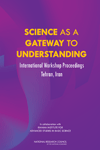 Science as a Gateway to Understanding. International Workshop Proceedings, Tehran, Iran (2008)
Science as a Gateway to Understanding. International Workshop Proceedings, Tehran, Iran (2008)
 Read online free
Read online free  Buy the book or Download the Free PDF
Buy the book or Download the Free PDF
In October 2007, the U.S. National Academies and the Iranian Institute for Advanced Studies in Basic Science organized the first of a series of planned U.S.-Iranian workshops on the topic "Science as a Gateway to Understanding." This new workshop series is a component of the broader effort of the National Academies to support bilateral workshops and exchange visits in a variety of fields with a number of Iranian institutions that began in 2000. This book includes papers that were presented at the workshop and summaries of the discussions that followed some of the presentations. At the conclusion of the workshop there was general agreement that the presentations on many aspects of science and scientific cooperation that have a bearing on mutual understanding were an important first step. Several participants underscored that the next workshop should emphasize how scientific cooperation can lead in concrete terms to improved understanding among both academic and political leaders from the two countries. (Development, Security, and Cooperation (DSC))
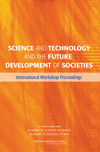 Science and Technology and the Future Development of Societies: International Workshop Proceedings (2008)
Science and Technology and the Future Development of Societies: International Workshop Proceedings (2008)
 Read online free
Read online free  Buy the book or Download the Free PDF
Buy the book or Download the Free PDF
In June 2006, 17 scientists and educators selected by the National Acadmies, the Academy of Sciences of Iran, and the Académie des Sciences of France held a workshop at the estate of the Fondation des Treilles in Toutour, France to discuss issues concerning the role of science in the development of modern societies. These proceedings summarize the presentations made at the workshop and the discussions that followed them. The participants’ expertise represented a broad array of science and technology disciplines, including anthropology, engineering, education, chemistry, agriculture, psychology, and health sciences. The topics addressed science-oriented themes in K-12 education, management, ethics, socioeconomic development, and policymaking. The National Academies is currently exploring opportunities to continue such discussions in Iran, and this report provides useful background for the further development of interactions of Western scientists and educators with Iranian specialists. (Policy and Global Affairs (PGA))
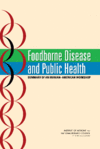
Foodborne Disease and Public Health: Summary of an Iranian-American Workshop (2008) (Joint report w/Institute of Medicine)
 Read online free
Read online free  Buy the book or Download the Free PDF
Buy the book or Download the Free PDF
The Institute of Medicine’s Food and Nutrition Board and the National Research Council’s Policy and Global Affairs Division convened a workshop in Washington, D.C., entitled Foodborne Disease and Public Health:An Iranian-American Workshop. The overall goals of this workshop were to facilitate the exchange of ideas about foodborne disease and public health and to promote further collaboration among Americans and Iranians on this topic of mutual interest. Experts invited to participate in this workshop addressed a variety of topics, ranging from the surveillance of outbreaks of foodborne illness to approaches to medical training in the Iranian and U.S. educational systems. The workshop was part of a series of cooperative efforts between the United States and Iran as the two countries have collaborated in the past on similar projects relating to foodborne disease. (Policy and Global Affairs (PGA))
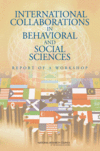
International Collaborations in Behavioral and Social Sciences Research: Report of a Workshop (2008)
 Read online free
Read online free  Download the report brief (PDF)
Download the report brief (PDF)  Buy the book or Download the Free PDF
Buy the book or Download the Free PDF
Based on the outcomes of a workshop convened by the U.S. National Committee for Psychological Science and informed by a survey of social scientists who have led cross-national projects, this National Science Foundation-funded report addresses the multiple benefits of research extending across national boundaries and describes factors common among successful collaborations. Workshop participants identified the obstacles frequently encountered and suggested ways of dealing with these challenges to enhance international collaborative research in the behavioral and social sciences. Several dimensions of collaborative processes, such as research planning, methodological issues, organizational concerns, varied training approaches, and funding needs receive critical attention in this book. (Board on International Scientific Organizations (BISO))
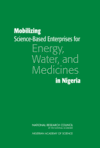 Mobilizing Science-Based Enterprises for Energy, Water, and Medicines in Nigeria (2007)
Mobilizing Science-Based Enterprises for Energy, Water, and Medicines in Nigeria (2007)
 Read online free
Read online free  Buy the book or Download the Free PDF
Buy the book or Download the Free PDF
Developed in collaboration with the Nigerian Academy of Science, this report explores the ways in which science-based private enterprises can be created and encouraged in Nigeria and other developing countries to provide products and services that government is unable to supply in a timely and sustainable manner. Focusing on three critical challenges to health and development-- safe water, electrical lighting, and malaria therapy—the report identifies a sample technology to address each of these challenges with potential for commercialization in Nigeria and Africa, and uses that sample technology to identify opportunities and barriers to creating the science-based enterprises in Nigeria. (Development, Security, and Cooperation (DSC))
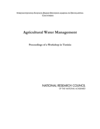
Agricultural Water Management: Proceedings of a Workshop in Tunisia (Series: Strengthening Science-Based Decision Making in Developing Countries) (2007)
 Read online free
Read online free  Buy the book or Download the Free PDF
Buy the book or Download the Free PDF
This report contains a collection of papers from a workshop---Strengthening Science-Based Decision-Making for Sustainable Management of Scarce Water Resources for Agricultural Production, held in Tunisia. Participants, including scientists, decision makers, representatives of non-profit organizations, and a farmer, came from the United States and several countries in North Africa and the Middle East. The papers examined constraints to agricultural production as it relates to water scarcity; focusing on 1) the state of the science regarding water management for agricultural purposes in the Middle East and North Africa 2) how science can be applied to better manage existing water supplies to optimize the domestic production of food and fiber. The cross-cutting themes of the workshop were the elements or principles of science-based decision making, the role of the scientific community in ensuring that science is an integral part of the decision making process, and ways to improve communications between scientists and decision makers. (
Science and Technology for Sustainability (STS))
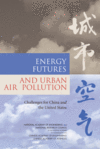 Energy Futures and Urban Air Pollution: Challenges for China and the United States (2007)
Energy Futures and Urban Air Pollution: Challenges for China and the United States (2007)
 Read online free
Read online free  Download the report brief (PDF)
Download the report brief (PDF)  Buy the book or Download the Free PDF
Buy the book or Download the Free PDF
The U.S. and China are the top two energy consumers in the world, and they are also the top two emitters of numerous air pollutants which have local, regional, and global impacts. Urbanization has led to serious air pollution problems in U.S. and Chinese cities, and although U.S. cities continue to face challenges, the lessons they have learned in managing energy use and air quality are relevant to the Chinese experience. This report summarizes current trends, profiles two U.S. and two Chinese cities, and recommends key actions for each country to continue to improve urban air quality. As a result of this report, the Chinese case study cities of Dalian and Huainan are now working on monitoring additional air pollutants, specifically ozone and fine particulate matter (PM2.5). China is also expected to begin requiring nationwide monitoring of these pollutants--a central recommendation of the report.. (Development, Security, and Cooperation (DSC))
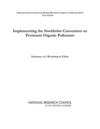 Implementing the Stockholm Convention on Persistent Organic Pollutants: Summary of a Workshop in China (Series: Strengthening Science-Based Decision Making in Developing Countries) (2007)
Implementing the Stockholm Convention on Persistent Organic Pollutants: Summary of a Workshop in China (Series: Strengthening Science-Based Decision Making in Developing Countries) (2007)
 Read online free
Read online free  Buy the book or Download the Free PDF
Buy the book or Download the Free PDF
This report summarizes a workshop --- Strengthening Science-Based Decision-Making: Implementing the Stockholm Convention on Persistent Organic Pollutants held June 7-10, 2004, in Beijing, China. The presentations and discussions summarized here describe the types of scientific information necessary to make informed decisions to eliminate the production and use of Persistent Organic Pollutants (POPs) banned under the Stockholm Convention, sources of information; scientifically informed strategies for eliminating POPs, elements of good scientific advice, such as transparency, peer review, and disclosure of conflicts of interest; and information dealing with POPs that decision makers need from the scientific community, including next steps to make such science available and ensure its use on a continuing basis. (Science and Technology for Sustainability (STS))
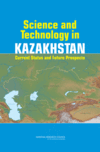
Science and Technology in Kazakhstan: Current Status and Future Prospects (2007)
 Read online free
Read online free  Download the report brief (PDF)
Download the report brief (PDF) Buy the book or Download the Free PDF
Buy the book or Download the Free PDF
Kazakhstan has an ambitious program to increase its technological competitiveness in the global market place during the next few years, but achieving success will depend in large measure on the effectiveness of upgraded science and technology (S&T) capabilities. This report identifies important opportunities and limitations in the education system, research and development (R&D) institutions, production companies, and service organizations to help governmental organizations in Kazakhstan with strong interests in S&T chart the future course of the country. (Development, Security, and Cooperation (DSC))
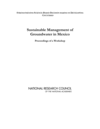 Sustainable Management of Groundwater in Mexico: Proceedings of a Workshop (Series: Strengthening Science-Based Decision Making in Developing Countries) (2007)
Sustainable Management of Groundwater in Mexico: Proceedings of a Workshop (Series: Strengthening Science-Based Decision Making in Developing Countries) (2007)
 Read online free
Read online free  Buy the book or Download the Free PDF
Buy the book or Download the Free PDF
This report contains a collection of papers presented at a workshop in Merida, Mexico --- Strengthening Science-Based Decision Making: Sustainable Management of Groundwater in Mexico. The cross-cutting themes of the workshop were the elements or principles of science-based decision making and the role of the scientific community in ensuring that science is an integral part of the decision making process. Papers included in this volume describe the groundwater resources of Mexico’s Yucatan Peninsula, approaches to managing groundwater in Mexico and governmental and scientific institutions concerned with water resources. Other papers discuss US approaches to managing scarce water resources. Participants in the workshop included representatives from leading scientific and academic institutions, federal state and local governments, non-governmental organizations and businesses. (Science and Technology for Sustainability (STS))
 Food Safety and Foodborne Disease Surveillance Systems: Proceedings of an Iranian-American Workshop (2006)
Food Safety and Foodborne Disease Surveillance Systems: Proceedings of an Iranian-American Workshop (2006)
 Read online free
Read online free  Buy the book or Download the Free PDF
Buy the book or Download the Free PDF  Download the report brief (PDF)
Download the report brief (PDF)
No Summary Available.
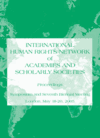
International Human Rights Network of Academies and Scholarly Societies: Proceedings - Symposium and Seventh Biennial Meeting, London, May 18-20, 2005 (2006)
 Read online free
Read online free  Buy the book or Download the Free PDF
Buy the book or Download the Free PDF
This report is the proceedings of the seventh biennial meeting of the International Human Rights Network of Academies and Scholarly Societies. (The international Network, created in 1993, consists of 70 national academies and scholarly societies around the world that work to address serious science and human rights issues of mutual concern. The Committee on Human Rights of the U.S. National Academies serves as the Network’s secretariat.) The meeting was held on May 18 and 20, 2005, at the Royal Society in London. The main events of the meeting were a semipublic symposium, entitled Scientists, Human Rights, and Prospects for the Future, and a workshop on a variety of topics related to science, engineering, and health in the human rights context. (Committee on Human Rights (CHR))
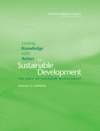
Linking Knowledge with Action for Sustainable Development: The Role of Program Management - Summary of a Workshop (2006)
 Read online free
Read online free  Buy the book or Download the Free PDF
Buy the book or Download the Free PDF
This report summarizes a workshop organized by the National Academies’ Roundtable on Science and Technology for Sustainability. The workshop brought together a select group of program managers from the public and private sectors to discuss specific cases of linking knowledge to action in a diverse set of integrated observation, assessment, and decision support systems. Workshop discussions explored a wide variety of experiments in harnessing science and technology to goals of promoting development and conserving the environment. Participants reflected on the most significant challenges that they have faced when trying to implement their programs and the strategies that they have used to address them successfully. The report summarizes discussions at the workshop, including common themes about the process of linking knowledge with actions for sustainable development that emerged across a wide range of cases, sectors, and regions. (Science and Technology for Sustainability (STS))
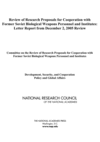
Review of Research Proposals for Cooperation with Former Soviet Biological Weapons Personnel and Institutes: Letter Report from December 2, 2005 Review (2006)
 Read online free
Read online free  Buy the book or Download the Free PDF
Buy the book or Download the Free PDF
An ongoing committee of the National Research Council assists the Department of Defense in the development and implementation of a program of expanded scientific cooperation and exchange in peaceful applications of the biological sciences between American research scientists and Russian research scientists who had participated in the biological weapons program of the former Soviet Union. The committee reviews project proposals submitted to DOD by research scientists from Russia, suggests potential collaborators from the United States, and evaluates results of collaborative projects. This letter report provides the committee’s assessment of the proposals considered at its December 2, 2005, meeting. (Development, Security, and Cooperation (DSC))
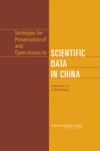 Strategies for Preservation of and Open Access to Scientific Data in China: Summary of a Workshop (2006)
Strategies for Preservation of and Open Access to Scientific Data in China: Summary of a Workshop (2006)
 Read online free
Read online free  Buy the book or Download the Free PDF
Buy the book or Download the Free PDF
Preservation of and open access to digital scientific resources are essential to global research, yet the challenges in storing and maintaining access to these collections are substantial. China faces major hurdles in this regard. A workshop held in June 2004 in Beijing convened scientific information managers, digital archiving experts, national science policy and funding officials, and representatives of development organizations to explore the scientific and technical, legal and policy, institutional and economic, and management aspects of creating sustainable and accessible archives of digital health and environmental data in China. (Board on International Scientific Organizations (BISO))
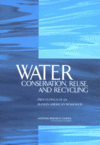 Water Conservation, Reuse, and Recycling: Proceedings of an Iranian-American Workshop (2005)
Water Conservation, Reuse, and Recycling: Proceedings of an Iranian-American Workshop (2005)
 Read online free
Read online free  Buy the book or Download the Free PDF
Buy the book or Download the Free PDF  Download the report brief (PDF)
Download the report brief (PDF)
In December 2002, a group of specialists on water resources from the United States and Iran met in Tunis, Tunisia, for an interacademy workshop on water resources management, conservation, and recycling. This was the fourth interacademy workshop on a variety of topics held in 2002, the first year of such workshops. Tunis was selected as the location for the workshop because the Tunisian experience in addressing water conservation issues was of interest to the participants from both the United States and Iran. This report includes the agenda for the workshop, all of the papers that were presented, and the list of site visits. (Development, Security, and Cooperation (DSC))
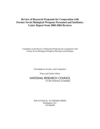 Review of Research Proposals for Cooperation with Former Soviet Biological Weapons Personnel and Institutes: Letter Report from 2000-2004 Reviews
Review of Research Proposals for Cooperation with Former Soviet Biological Weapons Personnel and Institutes: Letter Report from 2000-2004 Reviews (2005)
 Read online free
Read online free  Buy the book or Download the Free PDF
Buy the book or Download the Free PDF
An ongoing committee of the National Research Council assists the Department of Defense in the development and implementation of a program of expanded scientific cooperation and exchange in peaceful applications of the biological sciences between American research scientists and Russian research scientists who had participated in the biological weapons program of the former Soviet Union. The committee reviews project proposals submitted to DOD by research scientists from Russia, suggests potential collaborators from the United States, and evaluates results of collaborative projects. This report lists the proposals considered from 2000-2004 and summarizes the committee's recommendations. (
Development, Security, and Cooperation (DSC))
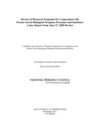 Review of Research Proposals for Cooperation with Former Soviet Biological Weapons Personnel and Institutes: Letter Report from June 27, 2005 Review (2005)
Review of Research Proposals for Cooperation with Former Soviet Biological Weapons Personnel and Institutes: Letter Report from June 27, 2005 Review (2005)
 Read online free
Read online free  Buy the book or Download the Free PDF
Buy the book or Download the Free PDF
An ongoing committee of the National Research Council assists the Department of Defense in the development and implementation of a program of expanded scientific cooperation and exchange in peaceful applications of the biological sciences between American research scientists and Russian research scientists who had participated in the biological weapons program of the former Soviet Union. The committee reviews project proposals submitted to DOD by research scientists from Russia, suggests potential collaborators from the United States, and evaluates results of collaborative projects. This letter report provides the committee’s assessment of the proposals considered at its June 27, 2005, meeting. (Development, Security, and Cooperation (DSC))
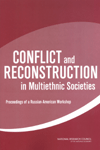
Conflict and Reconstruction in Multiethnic Societies: Proceedings of a Russian-American Workshop (2004)
 Read online free
Read online free  Buy the book or Download the Free PDF
Buy the book or Download the Free PDF
This report is the proceedings of a December 2001 international symposium in Washington, DC organized by the National Academies and the Russian Academy of Sciences. The symposium addressed (1) characteristics of peaceful management of tensions in multiethnic societies, particularly in Russia; (2) policies that have contributed to violence in such societies; (3) steps toward reconciliation; and (4) post-conflict reconstruction. (Development, Security and Cooperation (DSC))
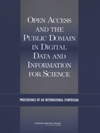 Open Access and the Public Domain in Digital Data and Information for Science: Proceedings of an International Symposium (2004)
Open Access and the Public Domain in Digital Data and Information for Science: Proceedings of an International Symposium (2004)
 Read online free
Read online free  Buy the book or Download the Free PDF
Buy the book or Download the Free PDF
This symposium, which was held on March 10-11, 2003, at UNESCO headquarters in Paris, brought together policy experts and managers from the government and academic sectors in both developed and developing countries to (1) describe the role, value, and limits that the public domain and open access to digital data and information have in the context of international research; (2) identify and analyze the various legal, economic, and technological pressures on the public domain in digital data and information, and their potential effects on international research; and (3) review the existing and proposed approaches for preserving and promoting the public domain and open access to scientific and technical data and information on a global basis, with particular attention to the needs of developing countries. (Board on International Scientific Organizations (BISO))
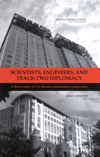
Scientists, Engineers, and Track-Two Diplomacy: A Half-Century of U.S.-Russian Interacademy Cooperation (2004)
 Read online free
Read online free  Buy the book or Download the Free PDF
Buy the book or Download the Free PDF
This report is intended to provide a brief historical perspective of the evolution of the interacademy program during the past half-century, recognizing that many legacies of the Soviet era continue to influence government approaches in Moscow and Washington and to shape the attitudes of researchers toward bilateral cooperation in both countries (of special interest is the changing character of the program during the age of perestroika (restructuring) in the late 1980s in the Soviet Union); to describe in some detail the significant interacademy activities from late 1991, when the Soviet Union fragmented, to mid-2003; and to set forth lessons learned about the benefits and limitations of interacademy cooperation and to highlight approaches that have been successful in overcoming difficulties of implementation. (Development, Security and Cooperation (DSC))
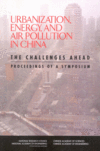
Urbanization, Energy, and Air Pollution in China: The Challenges Ahead -- Proceedings of a Symposium (2004)
 Read online free
Read online free  Buy the book or Download the Free PDF
Buy the book or Download the Free PDF  Download the report brief (PDF)
Download the report brief (PDF)
In October 2003, a group of experts met in Beijing under the auspices of the Chinese Academy of Sciences, Chinese Academy of Engineering, and National Academy of Engineering (NAE)/National Research Council (NRC) of the National Academies to continue a dialogue and eventually chart a rational course of energy use in China. This collection of papers is intended to introduce the reader to the complicated problems of urban air pollution and energy choices in China. (Development, Security and Cooperation (DSC))
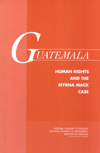
Guatemala: Human Rights and the Myrna Mack Case (2003)
 Read online free
Read online free  Buy the book or Download the Free PDF
Buy the book or Download the Free PDF
Two members of the Committee on Human Rights (CHR), NAS member Mary Jane West-Eberhard and NAS/NAE member Morton Panish, undertook a mission to Guatemala to observe the trial of two high-level Guatemalan military officials who were charged with ordering the murder of Guatemalan anthropologist Myrna Mack. She was stabbed to death in 1990, two days after a report for which she was principal researcher, “Assistance and Control: Policies Toward Internally Displaced Populations in Guatemala,” was published by the Georgetown University Press. Ms. Mack had been doing research on and writing about the unjust treatment of the internally displaced people in Guatemala. Thirteen years after Ms. Mack’s murder—after the case had gone through dozens of courts and countless delays—a general and colonel in the Guatemalan military intelligence apparatus were brought to trial, and one was convicted. This marked the first time in Guatemalan history that a high-level military official had been brought to justice for atrocities he committed during Guatemala’s 30-year civil war. This report summarizes the one-month trial proceedings. (Committee on Human Rights (CHR))
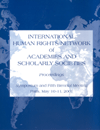
International Human Rights Network of Academies and Scholarly Societies: Proceedings - Symposium and Fifth Biennial Meeting, Paris, May 10-11, 2001 (2003)
 Read online free
Read online free  Buy the book or Download the Free PDF
Buy the book or Download the Free PDF
This report is the proceedings of the fifth biennial meeting of the International Human Rights Network of Academies and Scholarly Societies. (The international Network, created in 1993, consists of 70 national academies and scholarly societies around the world that work to address serious science and human rights issues of mutual concern. The Committee on Human Rights of the U.S. National Academies serves as the Network’s secretariat.) The meeting was held on May 10 and 11, 2001, at the Palais de l’Institut de France in Paris. The main events of the meeting were a semipublic symposium, entitled Human Rights and the Scientific Community, and a workshop on a variety of topics related to science, engineering, and health in the human rights context. (Committee on Human Rights (CHR))
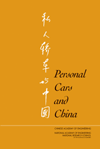
Personal Cars and China (2003)
 Read online free
Read online free  Download the report brief (PDF)
Download the report brief (PDF)  Buy the book or Download the Free PDF
Buy the book or Download the Free PDF
This collaborative study between the NRC and the Chinese Academy of Engineering (CAE) addresses the problems facing China in the next twenty years as it attempts to provide personal transport desired by millions of Chinese, while preserving the environment and the livability of its cities. According to Song Jian, president of the CAE, the decision has already been taken to produce a moderate cost family car in China, which will greatly increase the number of vehicles on the roads. This study explores the issues confronting the country, including health issues, the challenge to urban areas, particularly the growing number of megacities, environmental protection, infrastructure requirements, and technological options for Chinese vehicles. It draws on the experience of the United States and other countries and review model approaches to urban transportation and land use planning. Recommendations and policy choices for China are described in detail. (Development, Security and Cooperation (DSC))
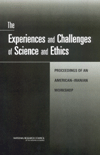
The Experiences and Challenges of Science and Ethics: Proceedings of an American-Iranian Workshop (2003)
 Read online free
Read online free  Download the report brief (PDF)
Download the report brief (PDF)  Buy the book or Download the Free PDF
Buy the book or Download the Free PDF
In April 2002, the U.S. National Academies hosted an interacademy workshop involving participants from the United States and Iran on the topic of Science and Ethics. The explicit purposes of the workshop were (a) to engage important members of the American and Iranian scientific communities in meaningful discussions of the topic of science and ethics and particularly differences in the approaches in the west and in Islamic countries in general and Iran in particular, (b) to encourage greater participation by Iranian scientists in international scientific discussions by exposing them to seasoned veterans in international meetings, and (c) to identify specific topics and approaches that could be carried out by the Academies in the two countries to contribute to international understanding of the importance of considering the ethical dimensions of scientific research and related activities. This report includes documents prepared by four breakout groups and a statement on priority areas for future interacademy cooperation developed at the final plenary session. Also included are background papers prepared by some participants prior to the workshop that were not previously published. (Development, Security and Cooperation (DSC))
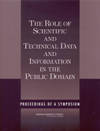
The Role of Scientific and Technical Data and Information in the Public Domain: Proceedings of a Symposium (2003)
 Read online free
Read online free  Buy the book or Download the Free PDF
Buy the book or Download the Free PDF
This symposium brought together leading experts and managers from the public and private sectors who are involved in the creation, dissemination, and use of scientific and technical data and information (STI) to: (1) describe and discuss the role and the benefits and costs--both economic and other--of the public domain in STI in the research and education context, (2) to identify and analyze the legal, economic, and technological pressures on the public domain in STI in research and education, (3) describe and discuss existing and proposed approaches to preserving the public domain in STI in the United States, and (4) identify issues that may require further analysis. (Board on International Scientific Organizations (BISO))
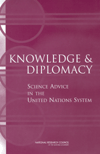
Knowledge and Diplomacy: Science Advice in the United Nations System (2002)
 Read online free
Read online free  Buy the book or Download the Free PDF
Buy the book or Download the Free PDF
In the international effort to advance human health, welfare, and development while better managing and conserving the environment and natural resources, there is a clear and growing recognition of the role of scientific and technical knowledge in global governance. This has created an urgent need for the United Nations to equip itself with the capability to bring scientific knowledge to inform international decision making. Given the complexity and diversity of United Nations programs, organs, and mandates, this report focuses on the main functions of the United Nations that affect international governance in the fields related to sustainable development, with reference to the taxonomy of the key United Nations organs in which these functions are undertaken. Efforts have been made to ensure that the major categories of United Nations organs have been covered and therefore the results of the review are representative of the functioning of the United Nations system. (Development, Security and Cooperation (DSC))
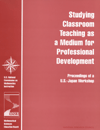
Studying Classroom Teaching as a Medium for Professional Development:Proceedings of a U.S.- Japan Workshop (2002)
 Read online free
Read online free  Buy the book or Download the Free PDF
Buy the book or Download the Free PDF
The Mathematical Sciences Education Board (MSEB) and the U.S. National Commission on Mathematics Instruction (USNCMI) took advantage of a unique opportunity to bring educators together. In August 2000, following the Ninth International Congress on Mathematics Education (ICME-9) in Makuhari, Japan, MSEB and USNCMI capitalized on the presence of mathematics educators in attendance from the United States and Japan by holding a two and a half--day workshop on the professional development of mathematics teachers. This workshop used the expertise of the participants from the two countries to develop a better, more flexible, and more useful understanding of the knowledge that is needed to teach well and how to help teachers to obtain this knowledge. A major focus of the workshop was to discuss teachers’ opportunities in both societies -- using teaching practice as a medium for professional development. Another focus of the workshop addressed practice by considering the records of teaching, including videos of classroom lessons and cases describing teachers and their work. These proceedings reflect the activities and discussion of the workshop using both print and video to enable others to share in their experience. (Board on Science, Technology and Economic Policy (STEP))

Data for Science and Society: Proceedings of the Second National Conference on Scientific and Technical Data (2001)
 Read online free
Read online free  Buy the book or Download the Free PDF
Buy the book or Download the Free PDF
In conjunction with several federal science agencies, the U.S. National Committee for CODATA organized the Second National Conference on Scientific and Technical Data: Data for Science and Society to address important multidisciplinary issues in managing and using scientific and technical (S&T) data and to improve the visibility of these issues nationally. The main focus was on promoting the availability and usefulness of S&T data to all users, both in research and in the broader society, using examples of ground-breaking and innovative applications and highly creative partnerships. The conference was held on March 13-14, 2000, at the National Academy of Sciences in Washington, D.C., and included a set of plenary presentations by invited speakers, as well as contributed poster presentations and technical demonstrations. These proceedings from the conference include only the invited plenary presentations. These presentations have been edited and reviewed according to standard National Research Council procedures, although they are included in this volume as the contributions of each individual speaker. (Board on International Scientific Organizations (BISO))






 Climate and Health Challenges Posed by Black Carbon: Proceedings of a Workshop–in Brief (2016)
Climate and Health Challenges Posed by Black Carbon: Proceedings of a Workshop–in Brief (2016) Building Infrastructure for International Collaborative Research in the Social and Behavioral Sciences: Summary of a Workshop (February 2015)
Building Infrastructure for International Collaborative Research in the Social and Behavioral Sciences: Summary of a Workshop (February 2015) 





 The Teacher Development Continuum in the United States and China: Summary of a Workshop (November 2010)
The Teacher Development Continuum in the United States and China: Summary of a Workshop (November 2010) 



 Science as a Gateway to Understanding. International Workshop Proceedings, Tehran, Iran (2008)
Science as a Gateway to Understanding. International Workshop Proceedings, Tehran, Iran (2008) Science and Technology and the Future Development of Societies: International Workshop Proceedings (2008)
Science and Technology and the Future Development of Societies: International Workshop Proceedings (2008)

 Mobilizing Science-Based Enterprises for Energy, Water, and Medicines in Nigeria (2007)
Mobilizing Science-Based Enterprises for Energy, Water, and Medicines in Nigeria (2007)
 Energy Futures and Urban Air Pollution: Challenges for China and the United States (2007)
Energy Futures and Urban Air Pollution: Challenges for China and the United States (2007) Implementing the Stockholm Convention on Persistent Organic Pollutants: Summary of a Workshop in China (Series: Strengthening Science-Based Decision Making in Developing Countries) (2007)
Implementing the Stockholm Convention on Persistent Organic Pollutants: Summary of a Workshop in China (Series: Strengthening Science-Based Decision Making in Developing Countries) (2007)
 Sustainable Management of Groundwater in Mexico: Proceedings of a Workshop (Series: Strengthening Science-Based Decision Making in Developing Countries) (2007)
Sustainable Management of Groundwater in Mexico: Proceedings of a Workshop (Series: Strengthening Science-Based Decision Making in Developing Countries) (2007) Food Safety and Foodborne Disease Surveillance Systems: Proceedings of an Iranian-American Workshop (2006)
Food Safety and Foodborne Disease Surveillance Systems: Proceedings of an Iranian-American Workshop (2006)


 Strategies for Preservation of and Open Access to Scientific Data in China: Summary of a Workshop (2006)
Strategies for Preservation of and Open Access to Scientific Data in China: Summary of a Workshop (2006) Water Conservation, Reuse, and Recycling: Proceedings of an Iranian-American Workshop (2005)
Water Conservation, Reuse, and Recycling: Proceedings of an Iranian-American Workshop (2005) Review of Research Proposals for Cooperation with Former Soviet Biological Weapons Personnel and Institutes: Letter Report from 2000-2004 Reviews (2005)
Review of Research Proposals for Cooperation with Former Soviet Biological Weapons Personnel and Institutes: Letter Report from 2000-2004 Reviews (2005) Review of Research Proposals for Cooperation with Former Soviet Biological Weapons Personnel and Institutes: Letter Report from June 27, 2005 Review (2005)
Review of Research Proposals for Cooperation with Former Soviet Biological Weapons Personnel and Institutes: Letter Report from June 27, 2005 Review (2005)
 Open Access and the Public Domain in Digital Data and Information for Science: Proceedings of an International Symposium (2004)
Open Access and the Public Domain in Digital Data and Information for Science: Proceedings of an International Symposium (2004)








